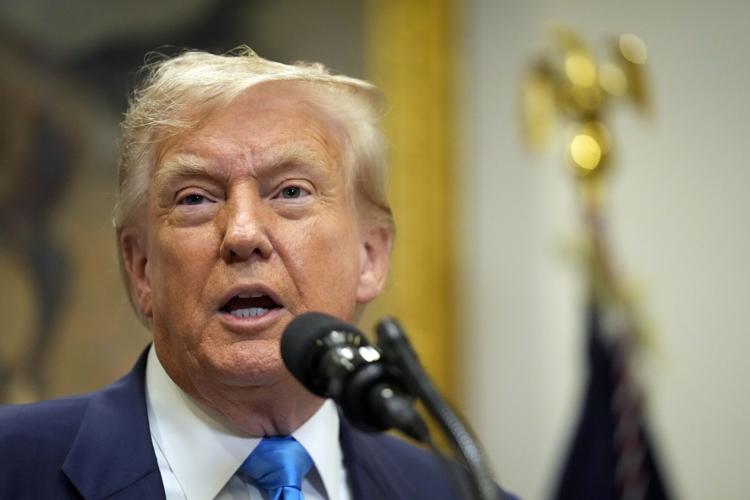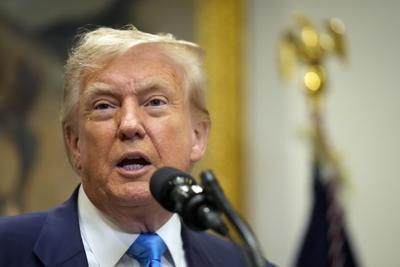OTTAWA ŌĆö U.S. President Donald Trump signed an executive order late Thursday hiking tariffs on certain Canadian goods to 35 per cent, with no deal materializing between Ottawa and Washington as the clock ticked towards an Aug. 1 deadline to reach a trade agreement.
A fact sheet issued by the White House confirms that tariffs on Canadian goods that don’t comply╠²with the Canada-U.S.-Mexico Agreement (CUSMA) will jump from 25 per cent to the 35 per cent Trump threatened to impose earlier in July, if Canada failed to take further action on halting the flow of fentanyl across the border.
Most Canadian goods meet the terms dictated by CUSMA, meaning they are not hit by the tariffs, which are separate from those targeting specific sectors.
“Shortly after returning to office, President Trump declared a national emergency under the International Emergency Economic Powers Act (IEEPA) to address, among other things, the public health crisis caused by fentanyl and illicit drugs flowing across the northern border into the United States,” Thursday’s fact sheet noted.
“Canada has failed to co-operate in curbing the ongoing flood of fentanyl and other illicit drugs, and it has retaliated against the United States for the PresidentŌĆÖs actions to address this unusual and extraordinary threat to the United States.”
In response, the fact sheet said, Trump “found it necessary” to boost the tariffs.
Prime Minister Mark Carney has yet to respond to the hike, but the federal government has already introduced legislation partly aimed at stopping the cross-border flow of illicit substances, appointed a “fentanyl czar” to curb the production and trafficking of the synthetic opioid, and mounted a $1.3-billion border plan to address the issue. While Trump claimed at the onset of the months-long trade dispute that illegal drugs were “pouring” across its northern border, only a very minor amount of the fentanyl smuggled into the U.S. originates from Canada.
Premier Doug Ford said on X that Ottawa should “hit back” with a 50 per cent levy on U.S. steel and aluminum.╠²
“The increase in U.S. tariffs to 35 per cent is concerning, especially with tariffs still in place on steel, aluminum, autos, forestry and now copper. While Canada continues to benefit from zero tariffs on all trade thatŌĆÖs USMCA compliant, representing over 90 per cent of our American exports, we need to do everything in our power to protect workers, businesses and communities from the impact of tariffs,”
Earlier in the day, White╠²House Press Secretary Karoline Leavitt suggested Trump could still cut deals with countries that had not yet reached agreements by midnight.
“I do know foreign leaders are ringing his phone, realizing this deadline is a real thing for them tomorrow, and they’re bringing offers to the table,” she said.
That prospect appeared increasingly dim for Canada╠²as the day wore on, with Dominic LeBlanc, CarneyŌĆÖs cabinet lead on Canada-U.S. trade, CarneyŌĆÖs chief of staff Marc-Andr├® Blanchard, and Kirsten Hillman, CanadaŌĆÖs ambassador to the U.S., holed up in Washington to seek out a deal.╠²On Wednesday, Carney signalled it was possible negotiations would extend beyond the deadline, and called the talks “constructive” and “complex.”
Trump said Thursday that where Mexico was concerned, he had initiated a 90-day negotiating period following a call with Mexican President Claudia Sheinbaum, and that Mexican imports would continue to be subject to a 25 per cent tariff, along with a 25 per cent tariff on autos and a 50 per cent tariff on steel, aluminum and copper.
But the gulf between Canada and its largest trading partner appeared to widen early Thursday morning, when Trump warned that Canada’s plan to recognize a state of Palestine had with Ottawa on the eve of his deadline.
By Thursday afternoon, Trump had softened his tone, telling reporters in Washington that while he “didn’t like” Canada’s decision, the move was “not a deal-breaker.”
“We haven’t spoken to Canada today. He’s called and we’ll see,” Trump said, appearing to refer to Carney.╠²
When asked what the holdup was with arriving at a deal with Ottawa, the president said Canada has been “treating our country very badly for years.”
“I love Canada, have so many friends in Canada, but they’ve been very poorly led. They’ve been very, very poorly led, and all we want is fairness for our country,” Trump said.
Carney said Wednesday that Canada intends to recognize a Palestinian state in September, a pledge that is contingent on the Palestinian Authority, the governing body in the occupied West Bank, agreeing to a series of democratic reforms. The reforms include holding general elections in 2026, in which Hamas can have no role, and ensuring that a Palestinian state is demilitarized. The prime minister said Palestinian Authority President Mahmoud Abbas had agreed to the conditions.
The announcement, which followed similar declarations from France and the United Kingdom, deepened the divide between Canada and Trump, a key ally to Israel.
TrumpŌĆÖs penchant for throwing last-minute wrenches into the works ŌĆö particularly when theyŌĆÖre not trade-related ŌĆö is unprecedented, said veteran trade lawyer John Boscariol.
ŌĆ£Trump is not using tariffs strictly for trade purposes but instead to achieve all these other objectives, and he moves the goalposts,ŌĆØ said Boscariol, head of the trade law group at the law firm McCarthy Tetrault.
TrumpŌĆÖs late-night musing about CanadaŌĆÖs potential recognition of a Palestinian state was reminiscent of his reference to the prosecution of former Brazilian president Jair Bolsonaro in his tariff letter to Brazil.
ŌĆ£This makes it much more challenging for CanadaŌĆÖs negotiators,ŌĆØ Boscariol said, warning that just because Mexico got an extension of the Aug. 1 deadline doesnŌĆÖt mean Canada will.
Flavio Volpe, the head of Canada’s Automotive Parts Manufacturers’ Association, said Thursday night he is still working with “Canadian negotiators on getting the best deal for domestic interests.” He added that the tariff increase “on a fabricated emergency premise continues to offend the interests of both Canadian and American companies trying to stay competitive against a rising Chinese hegemony.”
The president of the Canadian Chamber of Commerce, Candace Laing, called the White House’s fact sheet a “fact-less sheet.”
“The Carney government is right to prioritize a strong, future-focused deal over a rushed one,” Laing said in a statement.
“In the meantime, we have CUSMA, which, at present, is still being honoured, leaving much of our cross-border trade tariff-free. However, not all Canadian businesses have this advantage and the jump to 35% tariffs on non-CUSMA compliant products places an additional load on them.”
Earlier in the day, Catherine Cobden, CEO of the Canadian Steel Producers Association,╠²urged negotiators to push back on the hefty tariffs on steel imports, which have already led to job losses and production slowdowns in the country.
ŌĆ£Hold the line. Don’t accept 50 per cent,” Cobden said.╠²
CanadaŌĆÖs aluminum industry is also coping with the impact of 50-per-cent tariffs, and is still hopeful a deal can be reached to see them lowered.
When that will happen, however, is another matter, said Jean Simard, CEO of the Aluminum Association of Canada.
ŌĆ£ItŌĆÖs impossible truly to have a deal in time for Aug. 1,ŌĆØ said Simard. ŌĆ£WhatŌĆÖs left is either putting tariffs in, or pushing the deadline. And I think pushing the deadline is easier.ŌĆØ
With files from Mark Ramzy and Alex Ballingall
Error! Sorry, there was an error processing your request.
There was a problem with the recaptcha. Please try again.
You may unsubscribe at any time. By signing up, you agree to our and . This site is protected by reCAPTCHA and the Google and apply.
Want more of the latest from us? Sign up for more at our newsletter page.






























